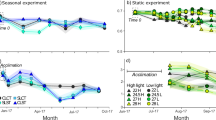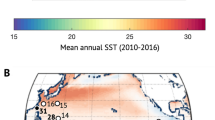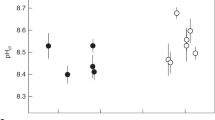Abstract
Rapidly rising levels of atmospheric CO2 are not only causing ocean warming, but also lowering seawater pH hence the carbonate saturation state of the oceans, on which many marine organisms depend to calcify their skeletons1,2. Using boron isotope systematics3, we show how scleractinian corals up-regulate pH at their site of calcification such that internal changes are approximately one-half of those in ambient seawater. This species-dependent pH-buffering capacity enables aragonitic corals to raise the saturation state of their calcifying medium, thereby increasing calcification rates at little additional energy cost. Using a model of pH regulation combined with abiotic calcification, we show that the enhanced kinetics of calcification owing to higher temperatures has the potential to counter the effects of ocean acidification. Up-regulation of pH, however, is not ubiquitous among calcifying organisms; those lacking this ability are likely to undergo severe declines in calcification as CO2 levels increase. The capacity to up-regulate pH is thus central to the resilience of calcifiers to ocean acidification, although the fate of zooxanthellate corals ultimately depends on the ability of both the photosymbionts and coral host to adapt to rapidly increasing ocean temperatures4.
This is a preview of subscription content, access via your institution
Access options
Subscribe to this journal
Receive 12 print issues and online access
$209.00 per year
only $17.42 per issue
Buy this article
- Purchase on Springer Link
- Instant access to full article PDF
Prices may be subject to local taxes which are calculated during checkout



Similar content being viewed by others
References
Kleypas, J. et al. Geochemical consequences of increased atmospheric carbon dioxide on coral reefs. Science 284, 118–120 (1999).
Langdon, C. & Atkinson, M. J. Effect of elevated p CO 2 on photosynthesis and calcification of corals and interactions with seasonal change in temperature/irradiance and nutrient enrichment. J. Geophys. Res. 110, C09S07 (2005).
Trotter, J. A. et al. Quantifying the pH ‘vital effect’ in the temperate zooxanthellate coral Cladocora caespitosa: Validation of the boron seawater pH proxy. Earth Planet. Sci. Lett. 303, 163–173 (2011).
Howells, E. J. et al. Coral thermal tolerance shaped by local adaptation of photosymbionts. Nature Clim. Change 2, 116–120 (2012).
Pandolfi, J. M., Connolly, S. R., Marshall, D. J. & Cohen, A. L. Projecting coral reef futures under global warming and ocean acidification. Science 333, 418–422 (2011).
Schneider, K. & Erez, J. The effect of carbonate chemistry on calcification and photosynthesis in the hermatypic coral Acropora eurystoma. Limnol. Oceanogr. 51, 1284–1293 (2006).
Hoegh-Guldberg, O. et al. Coral reefs under rapid climate change and ocean acidification. Science 318, 1737–1742 (2007).
Silverman, J., Lazar, B., Cao, L., Caldeira, K. & Erez, J. Coral reefs may start dissolving when atmospheric CO2 doubles. Geophys. Res. Lett. 36, 1–5 (2009).
Marubini, F., Barnett, H., Langdon, C. & Atkinson, M. J. Dependence of calcification on light and carbonate ion concentration for the hermatypic coral Porites compressa. Mar. Ecol. Prog. Ser. 220, 153–162 (2001).
Gattuso, J. P., Frankignoulle, M., Bourge, I. & Romaine, S. Effect of calcium carbonate saturation of seawater on coral calcification. Glob. Planet. Change 18, 37–46 (1998).
Rodolfo-Metalpa, R., Martin, S., Ferrier-Pages, C. & Gattuso, J. P. Response of the temperate coral Cladocora caespitosa to mid- and long-term exposure to pCO2 and temperature levels projected for the year 2100 AD. Biogeosciences 7, 289–300 (2010).
Al-Horani, F. A., Al-Moghrabi, S. M. & de Beer, D. The mechanism of calcification and its relation to photosynthesis and respiration in the scleractinian coral Galaxea fascicularis. Mar. Biol. 142, 419–426 (2003).
Cohen, A. L. & McConnaughey, T. A. in Biomineralization (eds Dove, P. M., Weiner, S. & de Yoreo, J. J.) Ch. 6, 151–187 (Reviews in Mineralogy & Geochemistry, Vol. 54, Mineralogical Society of America, 2003).
Allemand, D., Tambutté, E., Zoccola, D. & Tambutté, S. in Coral Reefs: An Ecosystem in Transition Vol. III (eds Dubinsky, Z. & Stambler, N.) 119–150 (Springer, 2011).
Venn, A., Tambutté, E., Holcomb, M., Allemand, D. & Tambutté, S. Live tissue imaging shows reef corals elevate pH under their calcifying tissue relative to seawater. PLoS ONE 6, e20013 (2011).
Ries, J. B. A physicochemical framework for interpreting the biological calcification response to CO2-induced ocean acidification. Geochim. Cosmochim. Acta 75, 4053–4064 (2011).
Rae, J. W. B., Foster, G. L., Schmidt, D. N. & Elliott, T. Boron isotopes and B/Ca in benthic foraminifera: Proxies for the deep ocean carbonate system. Earth Planet. Sci. Lett. 302, 403–413 (2011).
Lowenstam, H. A. & Weiner, S. On Biomineralization (Oxford Univ. Press, 1989).
Burton, E. A. & Walter, L. M. Relative precipitation rates of aragonite and Mg calcite from seawater: Temperature or carbonate ion control? Geology 15, 111–114 (1977).
Holcomb, M., Cohen, A. L., Gabitov, R. I. & Hutter, J. L. Compositional and morphological features of aragonite precipitated experimentally from seawater and biogenically by corals. Geochim. Cosmochim. Acta 73, 4166–4179 (2009).
Fine, M. & Tchernov, D. Scleractinian coral species survive and recover from decalcification. Science 315, 1811 (2007).
Gattuso, J-P., Allemand, D. & Frankignoulle, M. Photosynthesis and calcification at cellular, organismal and community levels in coral reefs: A review on interactions and control by carbonate chemistry. Am. Zool. 39, 160–183 (1999).
Schneider, K., Levy, O., Dubinsky, Z. & Erez, J. In situ diel cycles of photosynthesis and calcification in hermatypic corals. Limnol. Oceanogr. 54, 1995–2002 (2009).
Jokiel, P. & Coles, S. Effects of temperature on the mortality and growth of Hawaiian reef corals. Mar. Biol. 43, 201–208 (1977).
Marshall, A. T. & Clode, P. Calcification rate and the effect of temperature in a zooxanthellate and azooxanthellate scleractinian reef coral. Coral Reefs 23, 218–224 (2004).
Cooper, T. F., O’Leary, R. & Lough, J. M. Growth of Western Australian corals in the anthropocene. Science 335, 593–596 (2012).
Moy, A. D., Howard, W. R., Bray, S. G. & Trull, T. W. Reduced calcification in modern Souther Ocean planktonic foraminifera. Nature Geosci. 2, 276–280 (2009).
McCulloch, M. T. et al. Coral record of increased sediment flux to the inner Great Barrier Reef since European settlement. Nature 421, 727–730 (2003).
Leggat, W., Buck, B. H., Grice, A. & Yellowlees, D. The impact of bleaching on the metabolic contribution of dinoflagellate symbionts to their giant clam host. Plant Cell Environ. 26, 1951–1961 (2003).
Chalker, B. E. & Taylor, D. L. Light-enhanced calcification and the role of oxidative phosphorylation in calcification of the coral Acropora cervicornis (Lamarck). Proc. R. Soc. Lond. B 190, 323–331 (1975).
Marubini, F., Ferrier-Pagès, C. & Cuif, J-P. Supression of growth in scleractinian corals by decreasing ambient carbonate ion concentration: A cross-family comparison. Proc. R. Soc. Lond. B 270, 179–184 (2002).
Reynaud, S. et al. Interacting effects of CO2 partial pressure and temperature on photosynthesis and calcification in a scleractinian coral. Glob. Change Biol. 9, 1660–1668 (2003).
Marubini, F., Ferrier-Pagès, C., Furla, P. & Allemand, D. Coral calcification responds to seawater acidification: A working hypothesis towards a physiological mechanism. Coral Reefs 27, 491–499 (2008).
Ries, J. B., Cohen, A. L. & McCorkle, D. C. A nonlinear calcification response to CO2-induced ocean acidification by the coral Oculina arbuscula. Coral Reefs 29, 661–674 (2010).
Anthony, K. R. N., Kline, D. I., Diaz-Pulido, G., Dove, S. & Hoegh-Guldberg, O. Ocean acidification causes bleaching and productivity loss in coral reef builders. Proc. Natl Acad. Sci. USA 105, 17442–17446 (2008).
Ohde, S. & Hossain, M. M. Effect of CaCO3 (aragonite) saturation state of seawater on calcification of Porites coral. Geochem. J. 38, 613–621 (2004).
Broecker, W. S., Langdon, C., Takahashi, T. & Peng, T-S. Factors controlling the rate of CaCO3 precipitation on the Grand Bahama Bank. Glob. Biogeochem. Cycles 15, 589–596 (2001).
Langdon, C. et al. Effect of calcium carbonate saturation state on calcification rate of an experimental coral reef. Glob. Biogeochem. Cycles 14, 639–654 (2000).
Acknowledgements
The authors are grateful for financial support from the Australian Research Council Discovery grant DP0986505 awarded to M.M. and J.T. and to the Australian Research Council Centre of Excellence for Coral Reef Studies for support to J.F. and M.M. P.M. is grateful for financial support from the Marie Curie International Outgoing Fellowship (MEDAT-ARCHIVES) and M.M. is supported by a Western Australian Premiers’ Fellowship. This is ISMAR-CNR scientific contribution no. 1745.
Author information
Authors and Affiliations
Contributions
M.M. and J.T. designed the study and J.F., M.M. and P.M. carried out the model simulations. M.M. led the writing with contributions from all authors to the analysis of the results and writing the manuscript.
Corresponding author
Ethics declarations
Competing interests
The authors declare no competing financial interests.
Supplementary information
Rights and permissions
About this article
Cite this article
McCulloch, M., Falter, J., Trotter, J. et al. Coral resilience to ocean acidification and global warming through pH up-regulation. Nature Clim Change 2, 623–627 (2012). https://doi.org/10.1038/nclimate1473
Received:
Accepted:
Published:
Issue Date:
DOI: https://doi.org/10.1038/nclimate1473
This article is cited by
-
Fouling communities from the South African west coast are vulnerable to cooling and ocean acidification
Marine Biodiversity (2024)
-
Restoration and coral adaptation delay, but do not prevent, climate-driven reef framework erosion of an inshore site in the Florida Keys
Scientific Reports (2023)
-
Differences in carbonate chemistry up-regulation of long-lived reef-building corals
Scientific Reports (2023)
-
Multiscale mechanical consequences of ocean acidification for cold-water corals
Scientific Reports (2022)
-
Coral calcification mechanisms in a warming ocean and the interactive effects of temperature and light
Communications Earth & Environment (2022)



